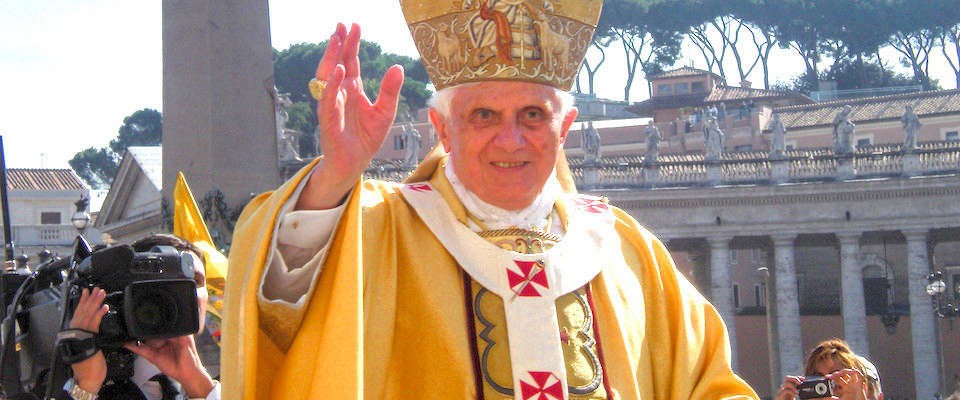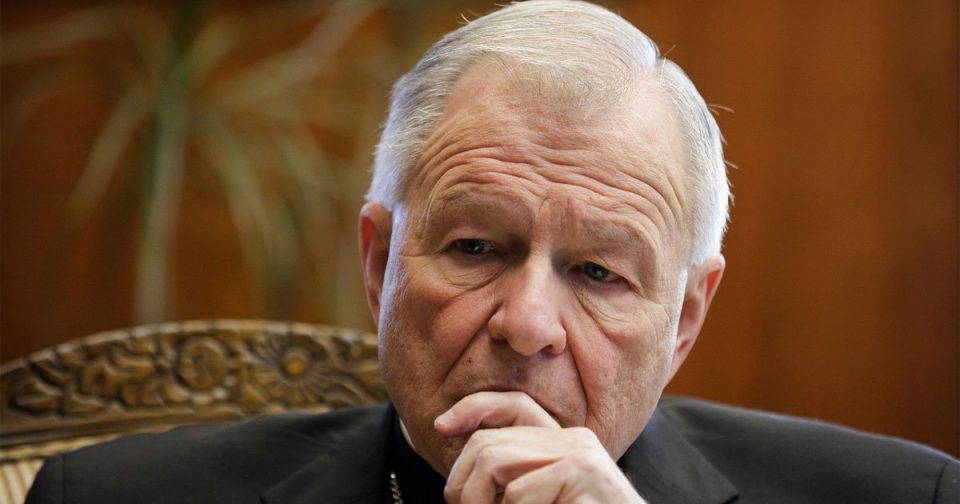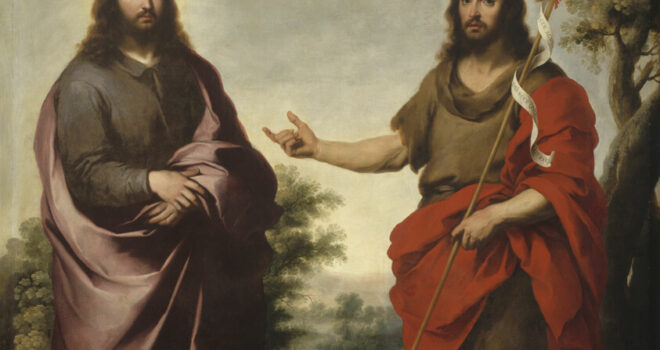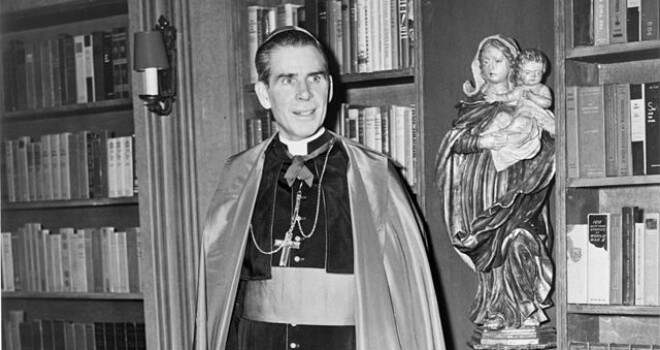Archbishop Charles J. Chaput: Benedict and the Scandal

POLITICS: The Day of Reckoning Is at Hand
April 12, 2019
Saint of the Day for April 13: St. Martin I (d. Sept. 6, 655)
April 13, 2019
By Archbishop Charles J. Chaput, O.F.M. Cap., First Things, April 11, 2019
Writing nearly half a century ago (1970), the Italian Catholic philosopher Augusto Del Noce noted that
I often find myself envying unbelievers: Does not contemporary history provide abundant evidence that Catholics are a mentally inferior species? Their rush to conform to the opinion about Catholicism held by rationalist secularists is stunning.
Those words from his essay “The Ascendance of Eroticism” open Del Noce’s brilliant reflections—part analysis, part prophecy—on Europe’s then-current sexual revolution. At a time when a young priest named Joseph Ratzinger was predicting a smaller, more hard-pressed, but purer Church of the future in his 1969–70 German and Vatican radio interviews, Del Noce was explaining how it would happen. He foresaw that “the decisive battle against Christianity [can] be fought only at the level of the sexual revolution. And therefore the problem of sexuality and eroticism is today the fundamental problem from the moral point of view.”
History has proven him right, and for obvious reasons. Sex is both a powerful bond and a fierce corrosive, which is why, historically, nearly all human cultures have surrounded it with taboos that order its harmonious integration into daily life. The naive eagerness—“stupidity” would not be too strong a word for Del Noce’s purposes—of many mid-century Church progressives in accepting, or at least accommodating, sexual license as a form of human liberation, spearheaded the intellectual collapse of an entire generation of Catholic moral theology. Since the 1960s, license has morphed into widespread sexual and social dysfunction, conflict, and suffering—also foreseen by Del Noce.
Unfortunately, the lessons of the ’60s are steadfastly ignored today by much of the Church’s own intellectual class: Simply put, sex is tied intimately to anthropology, to human self-understanding and the purpose of the body. Thus, for the Church to remain the Church, there can be no concordat with behaviors fundamentally at odds with the Word of God and the Christian understanding of the human person as imago Dei. All such attempts lead inevitably to what Ratzinger (now Benedict XVI, pope emeritus) once called silent apostasy. The current situation with Germany’s bishops’ conference comes to mind; but the problem is wider than a single local Church.
In his April 10 essay “The Church and the Scandal of Sexual Abuse,” a much older Joseph Ratzinger looks at the abuse phenomenon through the lens of his own life experience, dividing his text into three parts: origins of the crisis, initial Church responses, and what now needs to be done to heal Catholic life. The essay lacks some of the rigor of his earlier formal writings, and it will not satisfy those critics who see John Paul II and Benedict as slow in addressing the scale and gravity of the problem, but his words are nonetheless as clear and penetrating as ever.
Like the laypeople they serve and lead, priests are shaped by the culture from which they emerge. They should be held, rightly, to a higher standard because of their calling. But priests and bishops have no miraculous immunity to the abnormality bubbling around them. Ratzinger locates the seed of the current crisis in the deliberate turn toward sexual anarchy that marked much of Europe in the 1960s, and the complete failure of Catholic moral theologians to counter it—a failure that more often resembled fellow-traveling. He also notes, as did Del Noce, the dirty little secret of the sexual revolution: Relaxing sexual norms does not reduce an appetite for violence, including sexual violence. It does exactly the opposite.
Ratzinger acknowledges that “In various seminaries homosexual cliques were established which acted more or less openly and significantly changed the climate in the seminaries.” He also notes a problem that infected leadership: “Above all, a criterion for the appointment of new bishops [became] now their ‘conciliarity,’ which of course could be understood to mean rather different things.”
Ratzinger seeks to explain the initially slow and inadequate Church response to the abuse problem. He correctly saw the abuse issue as a crisis impacting the integrity of the faith and not merely as a legal matter grounded in the rights of accused clergy. Thus he successfully forced the transfer of abuse cases from Congregation of the Clergy jurisdiction to the Congregation for the Doctrine of the Faith where dealing with cases could be expedited. But even there, the scope of the problem proved larger than anyone anticipated. He remains silent on what many see as the continuing resistance of Rome to candidly name the core issue of the clergy abuse problem, which is not primarily a matter of clerical privilege but rather a pattern of predatory homosexuality.
Throughout his brief text, Ratzinger has moments of insight and genius that fall like rain in a desert, especially today. As in: “There are values which must never be abandoned for a greater value and even surpass the preservation of physical life. There is martyrdom. God is [about] more than physical survival. A life that would be bought by the denial of God, a life that is based on a final lie, is a non-life.” And: “A world without God can only be a world without meaning.” And: “A paramount task, which must result from the upheavals of our time, is that we ourselves once again begin to live by God and unto him.”
The words of the pope emeritus are especially piercing when he speaks of the many contemporary Catholics who treat the Eucharist—the Real Presence of God in our midst; the source and summit of Christian life—as “a mere ceremonial gesture . . . that destroys the greatness of the Mystery.” Or when he notes that the Church today “is widely regarded as just some kind of political apparatus,” and even many bishops “formulate their conception of the Church of tomorrow almost exclusively in political terms.” And finally this:
Today the accusation against God is, above all, about characterizing his Church as entirely bad, and thus dissuading us from it. The idea of a better Church, created by ourselves, is in fact a proposal of the devil, with which he wants to lead us away from the living God through a deceitful logic by which we are too easily duped. No, even today, the Church is not just made up of bad fish and weeds. The Church of God also exists today, and today it is the very instrument through which God saves us . . .
Today’s Church is more than ever a Church of the Martyrs, and thus a witness to the living God. If we look around and listen with an attentive heart, we can find witnesses everywhere today, especially among ordinary people, but also in the high ranks of the Church, who stand up for God with their life and suffering. It is an inertia of the heart that leads us to not wish to recognize them. One of the great and essential tasks of our evangelization is, as far as we can, to establish habitats of faith and, above all, to find and recognize them.




